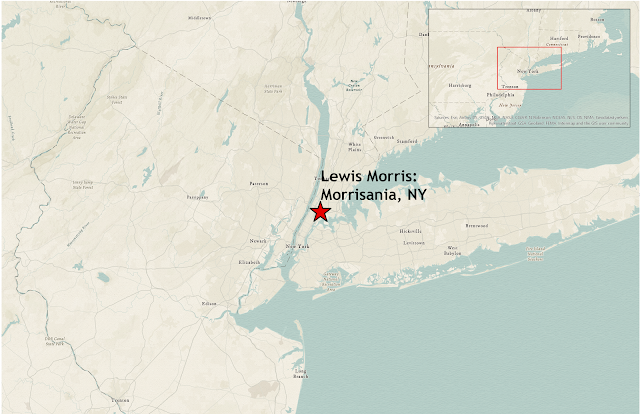Founding Fathers - Lewis Morris
Lewis Morris
Born: April 8, 1726 (Morrisania, New York)
Died: January 22, 1798 (Morrisania, New York)
Since we got to know Robert Morris last week, I thought it might be interesting to get to know another Morris this week, albeit an unrelated one. Lewis Morris was born on the 2,000 acre estate known as Morrisania within what is currently known as the Bronx, the first son of Lewis Morris II and his wife, Katrinje. His family was wealthy and owned a great deal of land throughout modern New York City, but were also involved in the politics of New Jersey. The elder Lewis Morris had successfully petitioned the crown for separate rule of the two colonies, and when it was granted in 1738 Morris became the governor of New Jersey. He was so popular that the city of Morristown was named in his honor. Meanwhile, young Lewis was privately educated by tutors and after showing a bit of acumen as a student was enrolled at Yale in 1743 at the age of 16. Four years later he graduated and returned home to help his father manage their family's interests, living on land close to modern Harlem. In 1749 Lewis married Mary Walton and the couple eventually had 10 children.
At the age of 34 Lewis Morris began his career in public service when he received an appointment as judge of the Admiralty Court. Just two years later, in 1762, his father died and left his eldest son the bulk of his substantial estate. The bulk of his wealthy neighbors were strong supporters of the Crown, but Morris himself began to challenge British rule due to a pair of laws passed in 1765 - the Stamp Act and the Quartering Act. Taxation without representation in Parliament was a sore topic to many on the west side of the Atlantic and was exacerbated by the forcing of colonies to also feed and house the troops sent to enforce it. Although Morris' views continued to break from many within his county, he was nevertheless elected to represent them in the Colonial Assembly in 1769. As hostilities became increasingly likely, he resigned his seat on the Admiralty Court in 1774 and overcame strong local opposition to see representatives sent to a revolutionary assembly called the New York Convention. As one of the delegates in this new governing body he was soon elected to represent New York at the Second Continental Congress.
The New York delegation was famously the only one of the 13 colonies who initially abstained from voting for the motion to declare independence from the Crown. It wasn't until July 11, 1776, that the members were permitted to vote for the motion and it officially became unanimous. Lewis Morris was warned that he had much to lose, given his home's proximity to British troops that were stationed nearby, but he threw caution to the wind and enthusiastically affixed his name to the Declaration. He quickly paid the price for his beliefs, as much of his property was destroyed or stolen after the Colonial Army was defeated in the Battle of Long Island, and the family home at Morrisania was significantly damaged. Morris served as a brigadier general in the militia and had both military and congressional duties that took him throughout New England while his family was dispossessed. In 1777 he resigned his position in Congress, succeeded by his half-brother Gouverneur Morris, and returned to New York as a county judge and state senator. Once the war ended, Morris was finally able to restore his home but much of his significant wealth was permanently lost. Beginning in 1784 he served on the Board of Regents for the University of New York and later strongly advocated for the ratification of the new Constitution in 1788. Morris left the New York Senate in 1790 and retired to a private life, running his property and supporting education until his death in 1798 at the age of 71. He was buried in the family crypt at the nearby St. Ann's Church.
The signature of Lewis Morris can be found as the fourth name on the fifth column beneath the Declaration of Independence.



Comments
Post a Comment